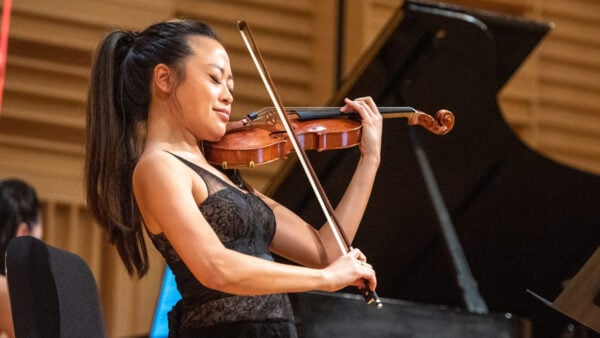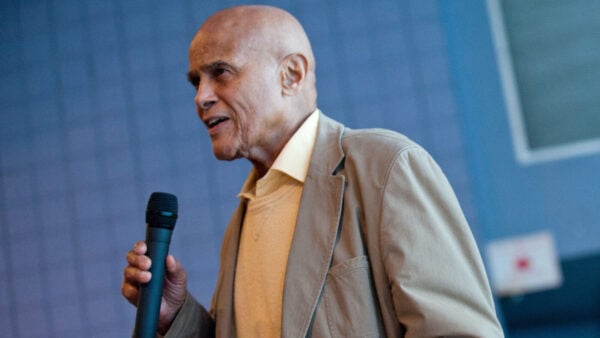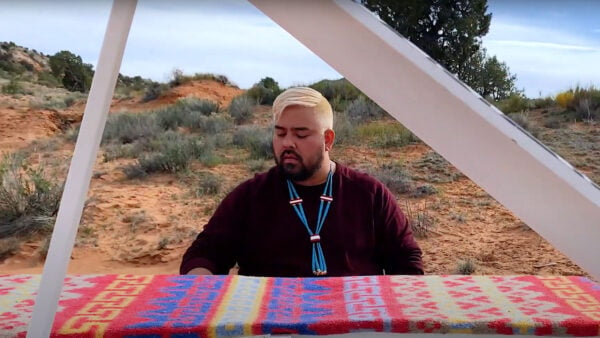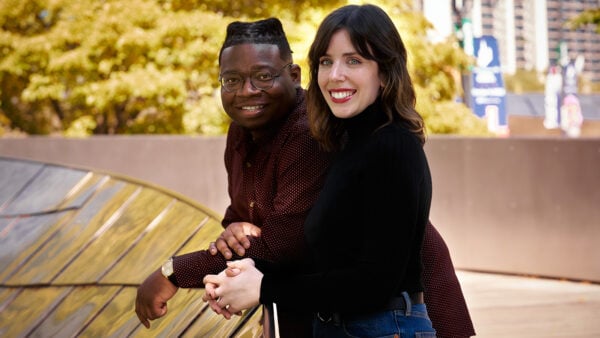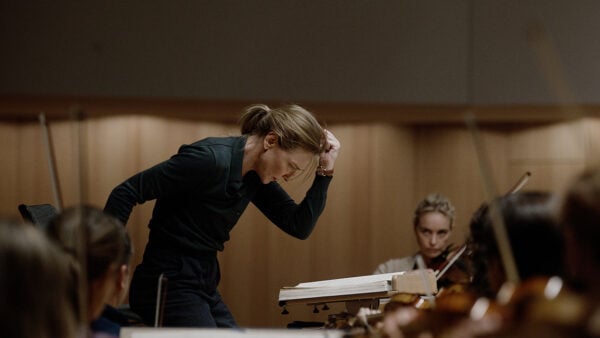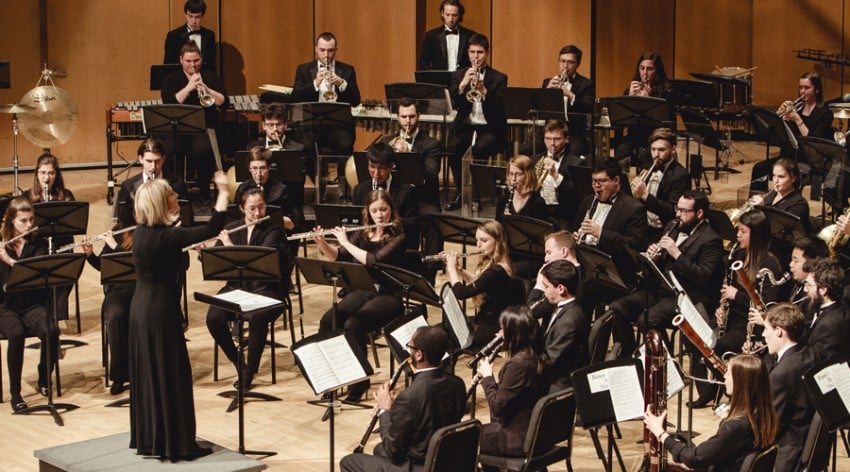
Dr. Mallory Thompson conducts the Northwestern University Symphonic Wind Ensemble at Pick-Staiger Concert Hall (Photo: Northwestern University Bienen School of Music)
When I was a freshman in high school, I was selected to perform in a district honors band. I decided to find some reference recordings for our repertoire, and with my new iTunes account, I purchased an album by Dr. Mallory Thompson and the Northwestern University Symphonic Wind Ensemble — I was awestruck. I had no idea that music could produce such incredible, colorful sounds, and I immediately developed a new goal: to perform in this group, affectionately known as “SWE.” A few years later, in my application to Northwestern, I wrote about how that experience listening to SWE influenced me, and to this day, I am proud to say that I performed in the ensemble.
Though Northwestern’s band program dates back to 1911, and with a few iterations of smaller wind bands in subsequent decades, John P. Paynter founded the Symphonic Wind Ensemble in 1969. Under the direction of Dr. Thompson, Northwestern’s third director of bands and John W. Beattie Chair of the Bienen School of Music, the ensemble continues to serve as an educational platform for many of the world’s leading woodwind, brass, and percussion musicians.
This year marks the 50th anniversary of SWE, and over 150 alumni from virtually every military band and major orchestra will return to the Evanston campus. Dr. Thompson and the alumni will present a free concert at Pick-Staiger Concert Hall on Sunday, June 9 at 7:30 pm (there will also be a live stream). In a program divided into three groups, with repertoire ranging from soothing serenades by Wolfgang Amadeus Mozart and Richard Strauss to massive works by David Maslanka and Sergei Prokofiev, the concert will celebrate Northwestern’s role in the evolution of the wind ensemble.
Before this reunion concert, I talked with Dr. Thompson about the history and legacy of SWE, how the wind ensemble medium has changed, and her advice for the next generation of musicians.
I thought we’d begin by talking about the term “wind ensemble.” Where did that come from, and how is it different than “band”?
The idea of the wind ensemble is credited to Frederick Fennell and the Eastman Wind Ensemble, but there were a number of parallel streams that led to this, including professional chamber societies, and you can go back to the Mozart serenades that were for mixed wind ensembles.
When I tell people that I’m a conductor, they’ll ask, “Do you conduct strings?” No. “Do you conduct voices?” No. “Oh, you’re the band director!” Well, kind of. I guess a band would be a large group with multiple players on parts, and a wind ensemble is a group that changes its structure based on the music that you’re playing. So any given concert could have everything from a wind octet, to an orchestral wind section, to a giant piece that might actually use multiple players on parts, but often the writing is more independent than band music writing.
How has the medium changed since the ensemble’s founding?
Our repertoire has just blown up over the last 50 years. It’s largely through the efforts of people like Fred Fennell, Mr. Paynter, and other leaders in the profession who’ve commissioned composers to write for us. And now there’s also a bit more of a crossing between wind ensemble music and new music, which is imaginative in many ways.
I think the demands on the players are tremendous today. In an average quarter in SWE, the students have to play Wagner and something that was written two years ago. I think it’s great for them, and I hope it’s really interesting for the audience. Every piece of music has a really different sound world. I find that really stimulating as an artist, to be involved in so many different sonorities, styles, time periods.
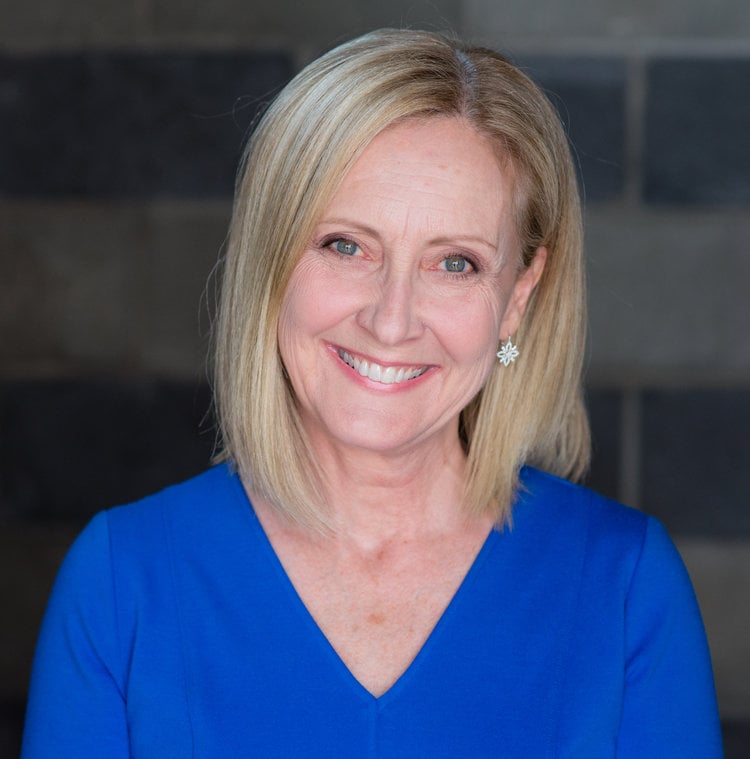
Dr. Mallory Thompson
With these artistic demands, how do you create “real-world” rehearsal and performance environments?
It’s an interesting position that I have, because while a lot of our students do go on to become professional military band musicians, many of them, maybe most of them even, want orchestral careers. So I really think about how I can do everything in my power to help prepare them for that. In many ways, since I’m rehearsing only the winds, brass, and percussion, I have the opportunity to really focus on only them. I don’t have to consider string bowings, I don’t have to deal with the difficulty of the string writing. They’re not just counting rests; they’re constantly playing.
I’m very mindful that music is music, and playing at the highest level is the same regardless of the genre. You have to play with a beautiful sound, you have to be able to interact with one another, and you have to have something to say as an artist.
I remember you telling us this when we played a transcription of Mussorgsky’s Pictures at an Exhibition—the medium doesn’t matter!
Exactly! I do like doing transcriptions because there’s beautiful music, and it gives me an opportunity to focus on different repertoire and performance practice that I think is valuable to the students.
Another thing that I find really helpful and just exciting to tell the students, is when I meet with alumni, I’ll ask them questions like, “What should I tell them about auditioning, some things that maybe they wouldn’t think of?” And one of the alums said, “They need to play something beautifully enough that it makes people look up. That it gets their attention in a positive way. It’s not enough to not screw up. You have to do something really that is musical, that has a point of view.”
And speaking of alums, over 150 former SWE members are returning to campus! How did the idea of creating this 50th anniversary reunion concert come about?
One of my graduate students, Daniel Cook, had done some research on the history of SWE and gave a presentation about it. And we saw coming up that SWE’s turning 50 — we could do a SWE-union! We got it on the books, and I wanted it to be when the students were here because I want them to hear it and have a chance to meet these alums. I’m having some panel discussions about entrepreneurship, how to form a professional chamber ensemble, auditioning, and other aspects that I think would be interesting and helpful to the students.
Everybody’s coming at their own expense, and a lot of our alums are trying to get released from professional obligations so they can do this. I just want it to be a really fun, special experience for them, to celebrate being together and being back home.
SWE’s legacy has also been celebrated over the years through the group’s wonderful recordings. What’s some advice you would give to a young student who has been inspired by these recordings, perhaps someone who is interested in pursuing a career in music?
Well I think if you love it, you must do it — no matter what. If you don’t pursue it, you don’t have a choice. If you pursue it, maybe later you’ll have a choice.
You don’t have to be the principal player of an orchestra to have a great life with music. Our alumni are perfect examples. There are the orchestral and military band players, and there’s also people who have formed their own chamber ensembles and won Grammys, people who teach privately or at a university. There are people who double majored and have careers outside of music but are still performing. So bottom line: if you burn to do it, you have to do it.
And I want to say this about playing in SWE, and it’s something that I’ve always believed and tell the students: they stand on the shoulders of everyone who has come before them. This isn’t a freelance group that we hire you in, you play, and you split. This is something that you become a part of, and it is a living, breathing organism with many parts to it.
Most of all, I just want our students to be happy people. It should be fun playing music; it should be fun working hard; it should be a celebration to perform! Something great should happen every single day — so that’s my expectation.
Dr. Mallory Thompson and the alumni of the Northwestern University Symphonic Wind Ensemble will present a free concert celebrating the 50th anniversary of the group on Sunday, June 9 at 7:30 pm in Pick-Staiger Concert Hall in Evanston.
This interview has been lightly edited for clarity.

